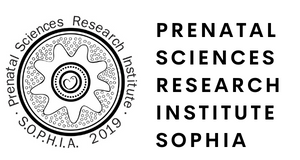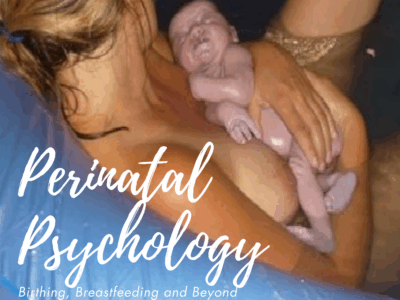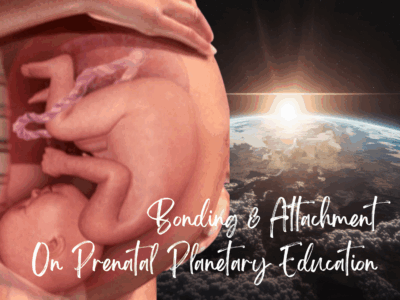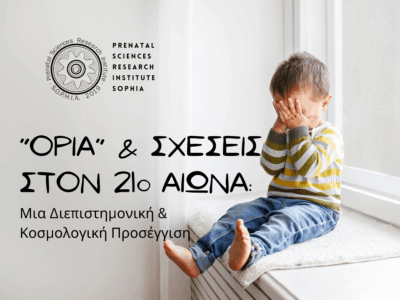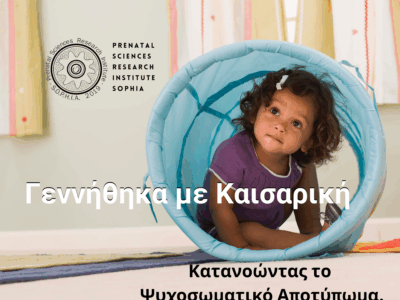What is Prenatal Psychology? What falls within its interest? What has each embryological scene to tell us about our human experience? How are our primal and adult experiences interlinked? What do people’s narratives tell us about their deep essence? As you study you will find out most significant aspects about who we are and who we become!
The Course is an introduction to Psychology concepts and acts as a framework of understanding for what is to follow, gradually introducing the Students into Prenatal Psychology. It teaches the essential concepts for anyone interested in psychology to find her/his own way as (s)he moves on with her/his studies:
- how it all started and how from philosophy, reflection and observation we came to modern psychology studies
- how concepts like psyche, logos, consciousness, mind, identity, self, etc developed
- how different scholars see human experience and the theories or schools of thought they developed
- how the system works in terms of what is involved in the understanding of how the information is perceived;
- how the human system interprets the data;
- or responds to the stimuli;
- how all this functions when the person is relaxed or when under stress.
The Student will have the opportunity:
- to study issues of consciousness and recognize altered states of consciousness;
- to distinguish between memory and recollection as seen not only by the modern Sciences but also the Aristotelian Philosophy;
- to delve into the depths of intelligence and how it develops;
- to examine the ways we learn and acquire not just knowledge in the meaning of new information but also how we learn ethical behaviors; how we develop a higher sense of living; how we can create civilization.
At the end of the course, the learner will be familiar with
- terms used in psychology
- models and theories in the discipline
- different schools of thought in the field
- what prenatal psychology is and how it differs from other schools of thought
- the various perspectives within prenatal psychology
- how prenatal stress impacts health
- how to listen to the narratives or writings (language) or art created by the client and recognize the inner landscape, patterns, traumas and other significant information of the person.
At a Glance…
In this course, this is what you are going to learn:
- Introduction to Psychology, the Nature of Psychology and a brief History
- Perception, Consciousness and Altered States of Consciousness
- Thinking Process & Intelligence
- On Memory & Anamnese
- Learning/ Conditioning
- Personality Theories & Assessment
- Stress and Coping Mechanisms
- Schools of Psychology
- What is Prenatal Psychology?
Course Features
- Lectures 9
- Quizzes 9
- Duration 76 hours
- Skill level All levels
- Language English
- Students 832
- Certificate Yes
- Assessments Yes
- 10 Sections
- 9 Lessons
- 10 Weeks
- IntroductionOverview: Introduction to Psychology: Understanding Psychology: Analysis of Logos and analysis of Psyche as found in the word psychology, The Nature of Psychology and a Brief History2
- Perception, Consciousness and its Altered StatesOverview: What is Perception? What is Consciousness? What are the main theories of both Perception and Consciousness? What consists "Altered States"? What causes Altered States of Consciousness? The main theories and models studying 1. Perception, 2. Consciousness and 3. Altered States of Consciousness and their pioneers. Summation of these theories and models. Trends in modern research in the fields. Benefits from studying each of them. How a professional in (Prenatal) Psychotherapy or a Health professional can benefit from these studies.2
- Learning/ ConditioningOverview: Learning/ Conditioning: Definitions. How do we learn? Is learning only a human trait? Learning Theories: Comparing theories (Behaviorism, cognitivism, onstructivism, Multiple Intelligences etc.)2
- Memory / AnamneseOverview: On Memory, Anamnesis in Plato's Meno & Phaedo, Traumatic Memories2
- Thinking Process & IntelligenceOverview: Concepts, Reasoning, and differences among concepts, categories, ideas, archetypes. Decision-making, Problem-solving. Modern theories of decision making. Early trauma and how it affects decision making. Why studying decision making can benefit a psychotherapist. What traits could a psychotherapist or educator or parent can cultivate so that the person can develop wise decision making.2
- Stress and Coping MechanismsOverview: Stress and coping mechanisms: A historical overview. Types of stress and trauma categories. How prenatal stress impacts prenates. Maternal or Paternal stress and offspring or next generations. Generational, intergenerational and transgenerational impact. Natural disasters and how they impact prenates, children, grandchildren. Resilience and adaptation. Healing?2
- Personality Theories & AssessmentOverview: On personhood, Self, Identity. Personality Theories and models. Psychological Types (Jung). Holland Codes Typology. Buddhist Personality Types. Personality Theories & Assessment tools. Why is the study of personality theories of good use in psychotherapy? Traits of a positive personality. How can parents cultivate such positive traits to their children even before conception?"Classic personality theories, although intriguing, are outdated. The five-factor model of personality traits reinvigorated personality research, and the resulting findings spurred a new generation of personality theories. These theories assign a central place to traits and acknowledge the crucial role of evolved biology in shaping human psychology; they also address the modifying influences of the social and cultural environment. Teachers can and should teach “personality theories” as a science course, not a history course". Robert R. McCrae, Personality Theories for the 21st Century2
- Schools of PsychologyOverview: The main schools of psychology. Main focus points. List of psychotherapies. Why are there so many schools of Psychology? Why so many Psychotherapeutic Approaches? Preferences of Psychotherapeutic Approaches in different continents. Where do they all meet? Common ethical guidelines.2
- What is Prenatal Psychology?Overview: Prenatal Psychology: Definition. Main findings. Different perspectives within Prenatal Psychology. A short summation of the evolution of the ideas researched in the field. Why prenatal sciences? Primal Health Advancement Programs based on the findings of Prenatal Psychology. Current trends2
- 0
